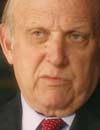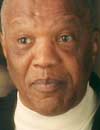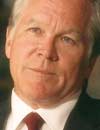- Floyd Abrams
First Amendment attorney - Earl Caldwell
Reporter - Lucy Dalglish
Executive director, The Reporters Committee for Freedom of the Press - Randall Eliason
Former prosecutor - Mark Feldstein
Professor, The George Washington University - James Goodale
First Amendment attorney - Bill Keller
Editor, The New York Times - William Bradford Reynolds
Former assistant attorney general
One of the advantages we have of interviewing you is that you were not only involved in the Pentagon Papers case, which was a victory, but then you were also involved, as I understand it, in the Branzburg [v. Hayes] case.
Right. I did a brief in the Branzburg case together with the same Professor [Alexander] Bickel who was counsel in The New York Times Pentagon Papers case on behalf of a large number of media entities urging the Court to create some sort of protection for the press.
And you lost.
Well, we lost. How much we lost still remains in dispute. There's no doubt that we lost. Where there is doubt -- and the reason that the law is maybe surprisingly unclear all these years after the 1972 ruling in the Branzburg case -- is that it was a 5-4 decision. And the fifth vote, Justice Lewis Powell, wrote a separate opinion saying things which sure sounded like he was saying: "Don't worry. It will be all right. We will still have a level of case-by-case balancing which will go on in this area as it's gone on in lots of other areas in the development of American law."
So lots of judges, lots of courts around the country and lots of legislatures have said that, after all, while there's no absolute privilege for the press, that there is a sort of qualified legal protection.
Now, some judges don't agree with that, and we may find out one of these days from the Supreme Court one way or the other just how to read the Branzburg case. ...
You just went through the Valerie Plame/[Scooter] Libby case. The appellate court in that case spoke directly, spoke very, very clearly, and said Branzburg stands; there is no ambiguity.
That's what they said: There's no ambiguity at all. There is no protection, the Court of Appeals in Washington said, for journalists in situations in which a grand jury seeks information in good faith from a journalist, period.
So the Supreme Court rules against you. [Editor's Note: Caldwell's case was combined with two others before the court and the case became known as Branzburg v. Hayes.]
Yes. They stole our victory. We had a victory. This Court of Appeals ruled that I did not have to go before the grand jury. No court anywhere had ever said that there is a reporter's right and there are circumstances where the reporter does not have to appear before the grand jury. ...
Then after [the Supreme Court decision], Jim Goodale took this defeat and spun his opinion on it about reporter's privilege.
Yes, he did. ... I'm not a lawyer, so I can't really say, but I do know this: In the difficult time, it was Tony Amsterdam who framed the arguments. It was Tony Amsterdam in the Legal Defense Fund that provided the wherewithal, and that until they start[ed] messing with us, we prevailed. That's clear. …
Branzburg is really Caldwell. When the government appealed this case to the Supreme Court, they folded two other cases into it. But those cases were materially different. Branzburg, he's a reporter; I support him; I think he was right. I think he had a right to keep his sources confidential. But the fact of the matter is [the] Branzburg case at its center involved illegal conduct -- somebody manufacturing drugs and hashish and some stuff in downtown Louisville. ... Caldwell case had no illegal activity. It's a reporter trying to do his job and the government messing with that reporter.
Tony Amsterdam told me after this case was over -- I always like this story -- he said it was the easiest case he ever had to argue at the Supreme Court. He said, "Because all you had to do was read the stories that Earl Caldwell wrote that were published in The New York Times, and then you would know why it's important for the government to leave him alone and let him do his work." …
The Reporters Committee got its start in 1970, at a time when the Nixon administration and even the Johnson administration had been very aggressive about going after journalists to find their confidential sources. Back then you'll recall there were a lot of undercover operations that the Nixon Justice Department was conducting, investigating anti-war activities, drug activities.
There were a number of reporters out there who were very aggressively covering these stories. Among them was a very talented, young, up-and-coming reporter for The New York Times named Earl Caldwell, who I believe was the first national reporter for The New York Times who was black.
He was based in Berkeley, [Calif.], and he had some sources in the Black Panthers. He got some information that nobody else was able to report. He got very close to them, so the Justice Department went after Earl. At that time, news organizations were not as likely to quickly come to the defense of a reporter who had been subpoenaed to identify confidential sources. ...
There were a number of reporters based in New York and the District of Columbia who said: "This is terrible. We've had hundreds of subpoenas served on the news media over the last couple of years to find out their confidential sources. Earl is really being harassed. This is a very high-stakes issue. We need to do something to defend him."
So they got together at the Georgetown Law School Library on a Sunday afternoon and said, "We need to come up with a committee of reporters to support reporters who are in this situation." It was high-profile reporters and editors such as [then-editor of The Washington Post] Ben Bradlee, Mike Wallace, Eileen Shanahan from The New York Times, [former CBS correspondent] Murray Fromson, [Common Ground author and journalist J.] Anthony Lukas, [print and television journalist] Fred Graham and [Los Angeles Times investigative reporter] Jack Nelson, people who turned out to be real lions of the industry. They created the Reporters Committee to provide support.
Of course the Caldwell case was one of the three that was consolidated into ... the only case the Supreme Court has ever heard on reporter's privilege issues, called Branzburg vs. Hayes. ...
And when you say "the only case," you mean the only case involving criminal law, because there have been civil cases that --
Not that the Supreme Court has actually granted cert. Branzburg is still the case that gets cited for the proposition that you don't get to protect your confidential sources.
But that's in the case of a federal grand jury subpoena.
Correct.
It's narrow on that basis.
That's what we always argue. For about 30 years we were successful in the federal courts in arguing that you have to limit Branzburg to what the Court actually said. You had that 4-1-4 decision. If you limit it and say that Branzburg squarely says that in a grand jury context, you're probably not going to be protected.
But some very creative media lawyers, led by Jim Goodale, who was at The New York Times many years ago, were able to convince many appellate court judges in the federal courts and in the state courts around the country that Branzburg needed to be limited to that grand jury context, and they were able to convince many judges that the balancing test provided by Justices [Lewis] Powell and [Byron] White ... was actually the law that should be applied in civil cases and in trial courts.
We had a certain level of success over the years in getting subpoenas knocked out in civil cases and in criminal trials. But starting about three years ago … that all just started going to pot, as they say.
Well, it's a pretty clear-cut case, because it's a grand jury investigation. There's a Supreme Court case that's been around for about 30 years called Branzburg [v. Hayes] that says that there is no privilege for a reporter to refuse to comply with a federal grand jury subpoena. There are other issues that arise in different kinds of cases, but in a case like this, where it's a federal grand jury, the courts are pretty uniform that there is no privilege. ...
Can you talk a bit about Branzburg, what that decision was and how it applies for this case?
Yes. Branzburg was a Supreme Court case in the early 1970s. It was actually four different cases that were consolidated and brought to the Supreme Court, the question of whether reporters do have a privilege under the First Amendment of the Constitution not to comply with a grand jury subpoena. ... The general argument that supporters of a reporter's privilege make is that if a reporter can be compelled to testify, then confidential sources will no longer trust the reporter, and they won't talk to them, and a reporter's ability to gather information and then transmit it to the public will be damaged, so the country's interest in a vigorous and free press will be damaged. ...
So it went to the Supreme Court on that question, and the Court, 5-4 -- it was very close -- ruled that there was no First Amendment privilege for a reporter to refuse to testify. The basic rationale of the Court was, yes, the free press is important, but there are other competing interests here as well. On the other side of the equation, there is the government's interest in investigating and prosecuting crime. ... The line they used is, the Court won't accept the argument that it's more important to write about crime than to do something about it, and so there is no privilege: You have to testify. ...
... How much is public opinion a factor in how these cases are decided?
Well, public opinion shouldn't affect at all the Court's decision. The courts should just apply the law and the Branzburg precedent and the other rules that are out there. Where public opinion might have more of an impact is in Congress. I mean, Congress has been considering this proposed federal [shield] legislation for some time now. It hasn't passed. ...
[7th Circuit Judge] Richard Posner wrote an opinion reminding everyone about what the actual verdict was in Branzburg v. Hayes, and people have correlated that with less of a reluctance now to subpoena journalists. ... Do you see that as having any influence in this decision with Josh Wolf?
I think it's pretty hard to make that correlation. Judge Posner is a very highly regarded judge, and that was an influential opinion, or an important opinion. But, you know, he's in the 7th Circuit; Josh Wolf is in California, not governed by Judge Posner's opinion. And the 9th Circuit has had its own law for a long time on when there is or is not a privilege, and held long ago that Branzburg does apply in a grand jury proceeding. So I just don't see it really having any significant effect. ...
The Branzburg case at the time was considered by press advocates to be a really negative case for the news media, because for the first time you had the Supreme Court, on record, saying that journalists did not have the right necessarily to protect their sources; that the courts were entitled to what they called "every man's evidence"; that reporters were not in any special, privileged class and therefore could be compelled to reveal confidential sources.
The news media was aghast at the time. This looked like one more effort by the Nixon administration to curtail the press.
But how did it happen?
Three cases got consolidated. There were three separate cases, but all had a key issue in common, and that was that journalists were refusing to go before grand juries and reveal confidential sources. Law enforcement wanted to know, who were their sources who were giving them information, ... and the journalists refused [to talk]. They felt that if they revealed that information, they would not only betray their sources, but they would hurt other journalists' ability to get this kind of information; that they had given their word and they were not going to violate that.
These three separate cases -- two involving the Black Panthers, one involving drug dealers -- made their way up through the court system and eventually were consolidated and made it to the Supreme Court.
The Supreme Court issued a decision, voted 5-4, to say that at least in some cases, journalists did in fact have to give up their sources, did have to testify; that they were not immune automatically from testifying just because they were journalists.
At the time this was thought to be a horrific case by the news media, because journalists could be forced to give up their sources. ...
But that changed?
That changed in the strange way that constitutional law has of evolving over time. The vote was 5-4. ... Justice [Lewis] Powell had a concurring opinion. It was the crucial fifth vote that got the majority. But it was a much weaker decision on behalf of the government than the other four. He put in there all kinds of qualifications about how the decision should be limited in its scope and had to be decided on a case-by-case basis that future courts, in interpreting the case, used, in essence, to undercut the 5-4 majority.
Instead, what happened was the 5-4 went this way, kind of shifted, ... as lower courts chose to interpret the justice's decision as allowing reporters to protect their sources, at least in some circumstances.
So what evolved was an uneasy truce between the government and the press, where for the past generation the government could have gone after reporters' sources, but did not go after reporters' sources. That only changed under the Bush administration.
My understanding is that the reporters lost in the Branzburg case, but the government never then asked them to testify or wanted their notes?
Well, that's one of the great ironies of this case is this pivotal case, which reporters lost, thought was a disaster, were forced to have to testify in theory, never in fact actually happened. ...
... [Did that] result from a change in the political and social atmosphere that was going on?
Yes. I'm not certain of the actual details in these three particular cases as to what happened, but the fact of the matter is Branzburg occurred in 1972; Nixon was still riding high. In another couple of years, of course, Nixon would have to resign in disgrace, and the media, rightly or wrongly, would be credited with his demise.
What you had was a sea change in historical and social terms in the U.S. in terms of the news media. You had a journalism that was now suddenly muscular, that had seen its role during Watergate expand and saw that they could help drive from office a corrupt president. And you had the public giving the press credit for helping drive him from office. ...
People often think that judges are born in robes, and they issue their decisions, as if like Moses, coming down from the Ten Commandments. But they don't. Judges operate in a historical and a social context, and judges all across the country were very much affected by Watergate, by what happened, by the recognition that the news media play a critical role as a watchdog in our society. The fact that the Nixon administration had to leave in disgrace undermined as well this decision, this victory it had won in the courts.
I think it's no accident that the lower courts undercut this decision and granted the news media more rights in the generation after Watergate, in part because they saw how important the news media could be and in part because they recognized that curtailing rights of the press was dangerous; they could be abused by government and that the society needed a watchdog press. ...
And you had another case ... that was coming up through the courts.
Yeah, it was Branzburg-Caldwell. ... We talk about the Branzburg case -- to me, it's not the Branzburg case, it's my case. It's the Caldwell case, but anyway. ... The chronology is, in 1971, the Pentagon Papers case broke. But in 1969, ... the first reporter's privilege case in this country of any consequence was tried in the courts. ... That was a huge case for me personally. ...
What was this case? ... What were the facts?
Well, what happened in this case, which is now called Branzburg, is that it started with a black reporter whose name is Earl Caldwell. Earl Caldwell was covering the Black Panthers in the late 1960s. ... And in 1969 -- I forget exactly when, February or March -- he received a subpoena from the U.S. government that was investigating threats made to the president by Black Panthers. He did not want to disclose any of his conversations with the Black Panthers, any of his sources, and he asked me what to do. ... And I said, without even consulting with anyone, "We're going to fight it."
Well, you may say, "So what?," because news organizations are fighting subpoenas all the time. Big deal. I mean, this was a big deal, because in the preceding two weeks, the Nixon administration ... had made a case somewhat that the press ought to be coughing up information to it.
Secondly, during that period of time, Nixon had a campaign going against the press. ... Bill Safire is writing speeches for then-Vice President [Spiro] Agnew with [Pat] Buchanan, and they're picking on the press. It was a huge press battle. So this case became a symbol of that battle. ... This case became a case of the press standing up to the government. And it's very much like the Pentagon Papers, which happened later -- the press standing up to the government. ...
What happened in a nutshell thereafter was that we won in the District Court; we won in the Court of Appeals, and that case went to the Supreme Court. The courts recognized the [reporter's] privilege in the District Court of California, recognized the privilege again in the Court of Appeals in California. And then that case went to the Supreme Court, but it wasn't under the name of Caldwell.
But first of all, you say "the privilege." What privilege?
... What we wanted to argue was that reporters did not have to testify under all circumstances. The government wanted to have an absolute position: "Whenever we want your information, reporters, you give it to us." Our position was, "No, you can't do that." We did not take an absolute position. ... What the press argued was that it did not have to give information or testimony to the government under all circumstances, only some special circumstances, which didn't exist in this case.
Even if it's a grand jury? Even if it's a federal grand jury?
Even if it's a grand jury. Doesn't make any difference who it is. We're the press; ... we're over here, this information is ours. You're over there, the government, and the twain shall never meet. We want to have some distance between the two of us, a line between the two of us. … The press can't be the arm of law enforcement because if it is, there's no ability for the public, for which the press is a surrogate, to criticize the government and look into what the government's done wrong. ...
To create that separateness, we came up with this idea that we, the reporters, should have a privilege -- namely, the reporter's privilege -- not to cough up this information every time the government wants it. This case involved a grand jury subpoena, and we told the government that the grand jury can't get this information unless you can show us that it's absolutely essential, that you really need it. And the judge bought the argument.
So it went up from the District Court --
And then it was ultimately appealed to the Court of Appeals, and they affirmed it, effectively. And then it went to the Supreme Court. ... But it went up with other cases. ...
What happened was all of a sudden, the same thing happened throughout the country. ... In Massachusetts and in Kentucky, two prosecutors, for whatever reason -- perhaps they saw what the government was doing -- sought to get information for its purposes for the state. ... In the case of Branzburg, the state prosecutor wanted information that [Louisville Courier-Journal reporter Paul] Branzburg had, effectively, about making marijuana. ...
In that case he lost, so he went up to the Supreme Court as a loser, along with Earl Caldwell, a winner, and [Massachusetts television reporter Paul] Pappas, a loser. So those three cases were combined, and I lost the name Caldwell because C comes after B. Branzburg is the name of the case.
And what did [the Branzburg case] decide?
... When the case came out and everybody had to read it quickly for next day's paper, it was reported that the case decided the press had no rights at all with respect to protecting this information. There was no reporter's privilege in the federal courts. ... I just wasn't going to buy that argument.
What do you mean, you weren't going to buy the argument? It's called the Supreme Court for a reason.
I know, but there's always a way to win press cases, I think. ... This is after the Pentagon Papers suits, by the way -- starts before, ends after. This is 1972. I won the Pentagon Papers all by myself, you know. ... After a while it goes to your head. But I could not as a practical matter go back to my pals in the newsroom and say, "I can't protect you because the Supreme Court has taken all your protection." You can't do that. ...
So I went back. I sent my family away, locked myself into a room in my apartment. The air conditioning was turned off, and I sweated out five pounds and a theory how the Branzburg case actually created a reporter's privilege for reporters, even though it seemed to have done the exact opposite.
You created a fantasy in your own mind?
(Laughs.) Some have said so, yes. Well, what happened was, in the Supreme Court you get nine votes, and in this particular case, you get ... four [opinions] ... against us, four [for us], and one in the middle, [Justice Lewis] Powell. Powell's the middle guy. Powell says effectively, "OK, I'm with you against the press on this case -- that's the grand jury subpoenas, under these circumstances -- but in other cases, there should be an ability for the press to deal with the subpoenas." He didn't spell out exactly what he meant.
So I said, well, look, if ... he's one and I've got four over here, last time I knew that made five, and that's more than the four that voted against me. So if I get another case that is perhaps a little different than Caldwell's case, I will argue that those five votes create a reporter's privilege. …
I had called a whole bunch of people before the case started to see if they would support me, The New York Times, in the Supreme Court. Well, I went back to all these people and I said: "I'm going to have a seminar and we're going to discuss freedom of the press. We're also going to discuss my little article [reinterpreting the Branzburg decision], and I'll see if I can persuade you to take that article and go back and fight this thing out state by state by state by state until we end up with enough body of law so that there's protection for reporters." …
I've been doing that for 35 years now, every year. ... Our theory was, and is still, ... go back and fight this thing out state by state by state by state until we end up with enough body of law so that there's protection for reporters. ... Get the state courts and the federal courts sitting in a state area, see if they can adopt my idea in this ... article; get lots and lots of cases, and we'll build up a whole body of protection for reporters. That was the theory. ...
The Supreme Court just refused to review the Branzburg decision in the Miller case.
Oh, well, that doesn't mean anything. The Supreme Court doesn't want to get into this because it's such a real difficult situation. ... [The] Supreme Court wants to let this thing get batted around in the lower courts forever, as long as they can, so they don't have to get into it, because it's a difficult issue. It's a difficult issue even when you take my privilege because you have to apply it, and it's not easy to figure out when you should testify, when you shouldn't. It's a very complicated issue.
But I'm absolutely convinced I'm right that Powell would not vote for every case that came before him, plus the other four judges, and force the reporters to testify. I'm absolutely clear on that. I'm right about that. The question is, what are the circumstances, and what are the rules? That's open for grabs. They would review that.
But do you regret that you wound up getting the Court of Appeals to reassert Branzburg [v. Hayes] without any equivocation whatsoever?
Well, I didn't get the Court of Appeals to do that. The Court of Appeals did that all on their own.
Well, you took the case there.
Yeah, and we could have decided to fold our tent earlier and cut a deal. Woulda, shoulda, coulda. ... That's sort of hard to know in hindsight. ...
In Branzburg, actually, it was a case that came out of Kentucky, and it was a reporter [Paul Branzburg of the Louisville Courier-Journal] who had witnessed some people who were doing drugs, basically producing and manufacturing drugs. I think [he had a] picture ... of their hands, and the question was, what's their identity? ... The real issue in the case was whether this reporter had to disclose in the grand jury where this happened, what was actually going on. He was not asked to disclose the identity of the people who were involved, because the shield law in Kentucky said if you witness a crime, as a reporter, you have to disclose what you witness, but you are shielded from divulging confidential sources if the source that you're dealing with asks to remain anonymous.
There's a technicality, because here he witnessed people who were committing the unlawful acts. If he saw the people, he could tell who he saw, as opposed to if he had an informant who came to him from afar. But the point is that the case really did involve a reporter who had witnessed a felony and had witnessed the people who were engaging in the felony. The Court was pretty clear in Branzburg that there is no testimonial privilege for a reporter who witnesses a crime and knows the identity of the person who's committing the crime at the time. There's no testimonial privilege that says you don't have to tell the grand jury the crime and identify the individual.
I know that it was named the Branzburg case, but a lot of the attention comes to Earl Caldwell. Can you talk to me a little bit about that? I know you argued the Branzburg section. But ... was it a similar situation in which it was believed that Caldwell had actually witnessed a crime as well?
Yeah, actually the Caldwell case was very similar. There was no question who Caldwell met with. He had been invited into the Black Panthers' meeting hall, and everybody knew he was there at the time, and they knew who else was there at the time. The real question in Caldwell was what did he hear, what did he see. And the grand jury was investigating crimes that related to threats on the president and those kinds of activities.
The reporter in Caldwell was not really asked to disclose sources. He was asked to go to the grand jury to testify as to what he heard and saw in the meeting room. ...
The Caldwell case most directly presented the constitutional issue, which is why I think Caldwell gets discussed a lot more than Branzburg or [television reporter Paul] Pappas, [the third journalist involved in the case ultimately called Branzburg v. Hayes]. …
The Caldwell case came to the Court because the 9th Circuit had said that the First Amendment gives to the reporter an absolute privilege. The question that was before the Court is whether the freedom-of-press right was a sufficient protection that would allow for the reporter to say no when called before a grand jury to testify, because of the chilling effect that would have on his sources. The reporter's claim was: "The only reason I was allowed in the backroom with the Black Panthers to witness what was going on is that I promised them that I would say nothing about what I heard. To the extent I would report, I would report on that which the public could observe just like I could observe." It presented the issue of whether the First Amendment freedom of the press gave to the reporters a privilege against testifying about confidential sources in a grand jury proceeding. ...
You said at the time it was a pretty celebrated case. Why? What was going on in the country at the time?
... My impression is that it was a celebrated case because it involved the media and reporters, and they made it celebrated. I'm not so sure there was any more to it than that. I think the press saw this as a watershed case, and they made much of the fact that if indeed Branzburg is decided in a way that says you have to testify, that the chill on the press would be extraordinary and that it would overnight dry up a lot of sources. ... It was not the kind of issue where people are marching in the streets or getting overly excited in that sense about it. ...
So the 9th Circuit ruled in favor of Caldwell, granting absolute privilege when it came to this sort of situation. When you were about to argue in front of the Court, were you concerned that you wouldn't win? Did you think you had a good chance of winning? ...
Well, I'd never argued before the Court and thought I had a good chance of winning, so it was a close issue. There is certainly a reasoned argument on the side of the press for saying that there ought to be some consideration given to some kind of a testimonial privilege, and I think that that argument resonated with Justice [Lewis] Powell in his concurring opinion, where he basically said, look, there's no absolute privilege, but the courts have a supervisory responsibility over grand juries, and they ought to make sure that using the press as an investigative arm of the government -- to go back to something you had asked me earlier -- is not abused; that they ought to ensure that if the reporters are going to be called to testify and disclose confidential sources, it ought to be related to criminal conduct, and the source ought to be connected with the conduct, and the crime ought to be something that's central to the investigation that the grand jury is talking about.
There is much in Justice [Byron] White's majority opinion that echoes that. I don't think Powell was way out of line in doing that as a concurrence. I think it's been maybe overread. But I believe that that was recognized by Justice White in his opinion, and that's what Justice Powell said. Then Justice [Potter] Stewart said it, but he put a little more weight on the balance that should favor the First Amendment. ...
So the Court had what you would hope. It had both sides putting forth the serious argument and putting it forth in a serious and considerate way. Then there were a large number of amicus briefs -- friend-of-the-court briefs -- that were filed. It's fair to say that there wasn't much that was either not considered or ill-considered in Branzburg. It was fully ventilated. The issue was given to the Court in all its variations and permutations, and the Court treated it as such and gave a serious decision on the issue. It's for that reason that I'm not sure that there's a whole lot of interest in the Court to revisit Branzburg. ...
What's the bottom line of Branzburg? ...
Branzburg answered the question is there a constitutional protection here for reporters? And it said, no, there is not. ... Branzburg said there's no testimonial privilege under the First Amendment, freedom of press, that protects reporters from going before a grand jury and giving testimony, even if it means disclosing confidences, certainly with respect to matters that directly involve criminal conduct that is under investigation by that grand jury. ... There is no testimonial privilege that is available to the reporters that protects them from testifying anymore than there is one that would protect me as a private citizen from testifying.
... When you heard the rulings, how did you feel? Were you happy? ...
... The thing that I remember most is that I was impressed with Justice White's opinion. It was thorough, it was comprehensive, and it did a very good job at discussing the varying underlying policy considerations that were in play. I'm not sure that I had fully expected to see that full a dissertation in the opinion, so my view was that he had done a very careful job.
Other than that, yeah, we were pleased. I don't know that we were dancing on the ceiling, but we were pleased, as I think always is the case when you prevail in the Supreme Court. ...
We interviewed James Goodale, and what he told me was he found out what the ruling was, and he decided he couldn't live with the idea that reporters weren't going to have a privilege, so he went, spent a weekend alone, read all the opinions, looked at Powell very carefully. In Powell he saw [an] opening [as] to ... how Branzburg actually created a reporter's privilege.... What do you think of how he sort of spun Branzburg? ...
… I don't find that surprising, nor do I find anything disingenuous or improper about that. That's the way lawyers tend to operate. I do believe that whatever silver lining he found, it was a pretty slender one, and it has not evolved into anything that would, I think, suggest a reporter's privilege of the sort that reporters hoped they would have or would like to have.
I believe it is the case that the decision itself made it clear that the government should not use the reporters in the investigative arm and should not abuse their ability to call reporters before a grand jury. I believe it made it clear that these are issues, when they come up, that are going to be taken seriously. I don't think anybody doubts for a second that reporters who say they don't want to testify are standing on principle. It's a principle that they hold dear and believe in vehemently. And I believe that because of that, and because of that recognition, that the courts generally, who are in charge of supervising grand jury investigations, do take a serious look when there is an issue that comes before the Court of this nature. ...
... To the extent [Goodale's interpretation of Branzburg] had an impact on the legal horizon, some lower courts -- not many -- but some lower courts, I think, expressed the view that reporters may have a privilege in certain circumstances. I think Judge [Richard] Posner in the 7th Circuit treated with that pretty squarely and said that was a misreading of Branzburg. I don't know where the general sense of the media is after the Posner decision.
There is a sort of 30-year period where across the country many judges agreed, it seemed, with Goodale's interpretation that reporters did pretty much have a privilege in most cases, except in very extreme cases. And actually, when we looked at reporters being subpoenaed during that 30-year period, it was ... really hard to find reporters who have been subpoenaed. Since the Posner ruling, ... there's an increase in the number of people subpoenaed. Now, it could just be a coincidence, or it could be that Posner really did have an impact. ... Can you just comment on that?
... I suspect that that phenomenon is more something where you should look to the executive branch rather than the judicial branch. It may well be that the politics of the issue and the administration that was responsible for law enforcement took a more relaxed view about subpoenaing reporters during that period of time, and then with the Court having come in and saying it's permissible to do it, decided that it was going to assert itself into that area more. ...
... Why is it important that Branzburg exists if there are 49 states that have shield laws? Why does it matter?
Well, Branzburg is a decision that essentially speaks at the federal level, so whatever shield laws there are at these various state systems that relate to state prosecutions would not apply to a federal prosecution. If Congress had enacted a federal shield law, then that would essentially say, notwithstanding Branzburg, there's ability for reporters to get protection in the federal system. But Congress hasn't done that. ...
![News War [site home page]](../art/p_title.gif)















